-

新人教版高中英语必修2Unit 4 History and Traditions-Listening&Speaking&Talking教案一
This unit is about history and traditions. From the opening page, we can know that this unit will introduce the history and traditions around the world. As Marcus Garvey says “A people without the knowledge of their past history, origin and culture is like a tree without roots”, it is important for students to realize the importance and value of knowing the history and traditions and their further meanings. And this part ( listening and speaking ) is divided into two parts: Part A---share views on historic sites, Part B ---talk about a visit to a historic tourist destination. By talking with a foreigner, the speakers introduce the historic attractions and their cultures. Part A is that William, a British student, who was going to visit the Confucius Temple and a Chinese student, Xiao Kong, who was going to the Confucius Temple to meet with the members of the research group, went together and exchanged their views on the Confucius Temple, Confucius, Confucius' descendants and Confucius' educational thoughts. Part B is a conversation between Xiao Yan, a youth hostel receptionist and Paul, a backpacker about the feelings and experience after visiting the Chinese famous tourist attraction Pingyao.1. Guide students to understand the content of listening texts in terms of the whole and key details; 2. Cultivate students' ability to guess the meaning of words in listening; discuss with their peers how to talk about historic spots and great person.3. Instruct students to use functional sentences of showing one’s excitement, surprise and disappointment.1. Guide students to understand the content of listening texts in terms of the whole and key details; 2. Cultivate students' ability to discuss with their peers the related topics.3. Enable students to use the functional items of showing one’s excitement, surprise and disappointment.

新人教版高中英语必修2Unit 4 History and Traditions-Discovering Useful Structure教案二
This teaching period mainly deals with grammar: The past participle is used as attributive and objective complement.1. Guide students to review the basic usages of the past participle used as attributive and objective complement.2. Lead students to learn to use some special cases concerning the past participle used as attributive and objective complement flexibly.3. Strengthen students’ great interest in grammar learning.1. Help students to appreciate the function of the past participle used as attributive and objective complement.2. Instruct students to write essays using the past participle used as attributive and objective complement.Step1:温故而知新。Analyze the underlined phrases and then sum up the common usages of the past participles.1.(教材P41)They had castles built(build) all around England, and made changes to the legal system.2.(教材P42)They use the same flag, known(know) as the Union Jack,...3.(教材P42)Judy and I had our car parked(park) in an underground car park near Trafalgar Square, where we could get our car battery charged(charge).Common points: f the past participle used as attributive and objective complement.Step 2:过去分词作定语时的意义1.及物动词的过去分词作定语,在语态上表示被动;在时间上,常表示动作已经发生或完成,有时也不表示时间性。Our teacher watched us doing the experiment and gave us a satisfied smile at last.我们的老师看着我们做实验,最后给了我们一个满意的微笑。The plan put forward at the meeting will be carried out soon.会上提出的计划将很快被执行。2.不及物动词的过去分词作定语,它不表示被动意义,只强调动作完成。Many little kids like gathering fallen leaves in the yard.

新人教版高中英语必修2Unit 4 History and Traditions-Reading and Thinking教案一
Features of languages1.Finally, in the 20th century, the southern part of Ireland broke away from the UK, which resulted in the full name we have today: the United Kingdom of Great Britain and Northern Ireland.该句是一个复合句。该句主句为:the southern part of Ireland broke away from the UK;which resulted in the full name we have today为which引导的定语从句代指前面整句话的内容,we have today为定语从句修饰先行词name。译文:最后,在20世纪,爱尔兰南部脱离英国,这导致了我们今天有的英国的全名:大不列颠及北爱尔兰联合王国。2.Almost everywhere you go in the UK, you will be surrounded by evidence of four different groups of people who took over at different times throughout history.该句是一个复合句。该句主句为:you will be surrounded by evidence of four different groups of people;其中Almost everywhere you go in the UK为让步状语从句; who took over at different times throughout history为定语从句修饰先行词people。译文:几乎无论你走到英国的任何地方,你都会发现历史上有四种不同的人在不同的时期统治过英国。3.The capital city London is a great place to start, as it is an ancient port city that has a history dating all the way back to Roman times.该句是一个复合句。该句主句为:The capital city London is a great place to start; as it is an ancient port city that has a history dating all the way back to Roman times.为原因状语从句;dating all the way back to Roman times为现在分词短语作定语修饰history。

新人教版高中英语必修2Unit 5 Music-Discovering Useful Structures教案二
4. When he got absorbed in his world of music, he felt as if he could “see” the beauty of the world around him, like he had in his previous life.P·P as adverbial: _________________________________________________________________.Function: _______________________________________________________________________.Step 5 Solid Complete the passage with the words in brackets in their correct forms.Well known as a successful band, the Impact members show quite a few striking qualities. They never ever give up. When _____________(question) by the media, they are not _____________(discourage) and practise even harder. They are improving themselves by attending several master training class. They are united. _____________(fill with) team spirit, they act as a whole, always aiming for glory. Step 6 Difference and similarity from -ingObserve the following examples.1. He went out, shutting the door behind him.=He went out, ________________________________________________________.2. Not knowing what to do, he went to his parents for help.=__________________________________________, he went to his parents for help.Similarity: _______________________________________________________________________________________________________________________________________________________.Difference : _______________________________________________________________________________________________________________________________________________________.Step Practice1. ________ in a hurry, this article was not so good. 因为写得匆忙, 这篇文章不是很好。2. ________ carefully, he found something he hadn’t known before. 他仔细读书时, 发现了一些从前不知道的东西。3. ________ why he did it, the monitor said it was his duty. 当被问及他为什么要这么做时, 班长说这是他的职责

新人教版高中英语必修2Unit 5 Music-Listening and Speaking教案
This lesson is about music. Students can classify the types of music through the instruments and its sound and can talk about their preferences about music, even join some activities and play a role in them according to their musical talents. On the basis, they are guided to use the languages to express their preferences and some plosive sounds and their rules.1. Classify the music types through the instruments and its sound.2. Listen and understand what the speakers’ preferences are and the reasons; talk about their own preferences and give their own reasons, using these sentences: “What kind of music do you like? And why? “ “Because it makes/gives me energy/peaceful.../touches my heart...”.3. Learn some plosives and the rules.4. Join some activities and play a role in them according to the talents. 1. Listen and understand what the speakers’ preferences are and the reasons;2. talk about their own preferences and give their own reasons, using these sentences: “What kind of music do you like? And why? “ “Because it makes/gives me energy/peaceful.../touches my heart...”.3. Learn some plosives and incomplete plosives and its rules.Step 1 Lead inPoint at the pictures on P50 and ask Q1: What are the people doing in the pictures below?Q2: What kind of music they are?Then play the MP3s one by oneStep 2 ListeningTask 1: A reporter from the school newspaper is interviewing students about music. Listen to the interviews. Draw lines between the words to make complete sentences. Some words will not be used.

新人教版高中英语必修2Unit 5 Music-Reading for Writing教案二
The Internet celebrity Gao Yifeng. Years ago, he owned 5 companies and the staffs over 1,000, but during the economy crisis, he became nothing but debt. He was so worried that his hair became white overnight. There was a time when he wanted to killed himself. But after listening to the song Start Over by Liu Huan, he decided to cheer himself up. He started a steamed bun shop and gradually became a national chain shops. Now he became successful again.Walter Haddon said, “Music is the medicine of a troubled mind.” Music contains such a pleasant and inspiring force. Music gave him courage and bravery. When he listened to the song, it made his spirit fly like a kite in the wind. Music gave him strength and brought him relief. It was the rock I leant on to become strong and to get through those hard times. I hope none of us have to go through the same kind of suffering that he did. At the same time, we all go through various periods when we feel sad or alone. During those times, music can help us in the same way that it helped him. I hope we all will somehow begin to treasure music and make it a part of our life. Thank you for your listening !5.Revise your writing each other.Does he/she explain how music has changed his/her/someone else’s life?Are some of the rhetorical devices included and used properly ?Does he/she talk about how music makes him/her/someone feel?Is the first word in each sentences capitalised?Does he/she use correct punctuation ?
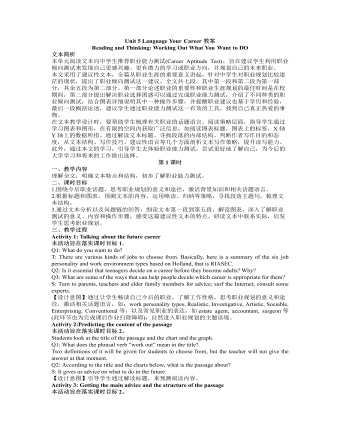
新人教版高中英语选修4Unit 5 Language Your Career教案
本单元阅读文本向中学生推荐职业能力测试(Career Aptitude Test),旨在建议学生利用职业倾向测试来发现自己更感兴趣、更有潜力的学习或职业方向,并规划自己的未来职业。 本文采用了建议性文本,全篇从职业生涯的重要意义讲起,针对中学生对职业规划比较迷茫的现状,提出了职业倾向测试这一建议。全文共七段,其中第一段和第二段为第一部分,其余五段为第二部分。第一部分论述职业的重要性和职业生涯规划的最佳时间是在校期间,第二部分提出解决职业选择困惑可以通过完成职业能力测试,介绍了不同种类的职业倾向测试,结合图表详细说明其中一种操作步骤,并提醒职业建议也基于学历和经验,最后一段概括论述,建议学生通过职业能力测试这一有效的工具,找到自己真正热爱的事物。 在文本教学设计时,要帮助学生梳理有关职业的话题语言。阅读策略层面,指导学生通过学习图表和图形,在有限的空间内获取广泛信息,如阅读图表标题,图表上的标签,X轴Y轴上的数据所指。
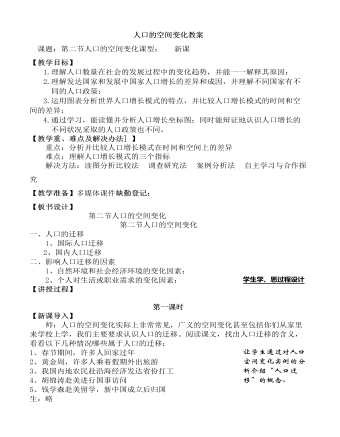
人教版高中地理必修2人口的空间变化教案
影响我国古代人口大规模迁移的因素,与影响我国近几十年人口迁移的因素有何不同?(古代:战乱,其次为开疆拓土、流放、戍边等。现代:国家政策、社会变革、经济发展、个人需求等。)2、为什么有这样的不同?(古代人口迁移受统治者及其行政力量的束缚。由于自给自足的经济十分脆弱,加之频繁的战争以及自然灾害等影响,人民难以安居乐业,不得不背井离乡大批迁移。近几十年来随着社会经济的发展、贸易的往来和交通的便捷,我国人口迁移不仅数量增加,而且频率加快,使各地人们的交往更加密切。)教师总结:从古今中外的人口迁移现象中,我们可以看出在人类历史早期人口迁移中重要的因素是什么?(自然因素)现在什么因素起重要作用?(经济因素)。但是在某种特定的时空条件下,任何一种因素都有可能成为促使人口迁移的决定性因素。【作业设计】查阅49年以来中国历年的人口数据资料,绘制人口增长的统计图表,探究中国人口增长的发展趋势
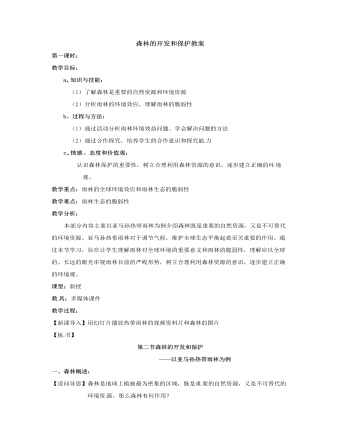
人教版高中地理必修3森林的开发和保护教案
角色扮演:学生扮演政府官员、热带丛林土著居民、 世界环保组织官员、开发商等角色,从角色的立场讨论亚马孙河流域热带雨林的开发活动规则: 每个小组认领一种角色,用5分钟的时间讨论和整理思路,然后推荐一位代表做中心发言,小组的其他同学可以随时补充。发言时请说 明所扮演的角色,尽可能多的发表建设性意见。如果需要,可以上台展示材料【学生互动】 风云辩论:雨林破坏谁之错?正方观点:雨林破坏,亚马孙地区 的国家和 居民应负主要责任反方观点: 雨林破坏,发达国家应负主要责任 【师生小结】 雨林的开发,既有发展中国家经济的需要,也有发达国家国际市场的牵动。保护雨林,是全人类的共同责任,尤其发达国家应该承担更多的责任。保护亚马逊雨林符合长远利益和全球利益。但这与雨林所在地国家的发展产生了矛盾,如何解决之一矛盾是雨林开发与保护的关键。【过渡承转】 绿色和平组织警告说,如果不采取有效措施制止对森林的破坏,80年内热带雨林可能完全从地球上消失。开发还是保护?这是雨林的两种前途,也
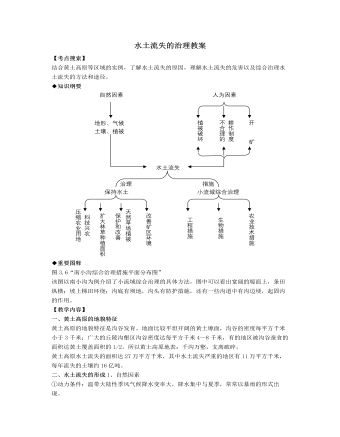
人教版高中地理选修2水土流失的治理教案
2、关于黄土高原小流域及其治理的叙述,正确的是()A.小流域不能看作是一个完整的地域单元B.小流域可以相当于黄土高原上一条河流的整个流域C.小流域综合治理的方针是“保塬、护坡、固沟“D.小流域的综合治理只能采用农业技术措施3、黄土高原植被遭到破坏的原因有()①营造宫殿,毁林开荒②修筑梯田,开石动土③开荒弃荒,轮荒作业④开露天矿,建隔离护坝⑤保塬护坡,打坝建库⑥开挖原生地面,复垦采空矿区A.①②④B.①③⑤C.①③D.②④4、下列关于黄土高原的叙述,正确的是()A.水土流失不可治理B.人为因素是黄土高原现代水土流失的主导因素C.植树种草是做好水土保持的基本前提D.开矿会加剧水土流失,故应少开矿5、引起黄土高原水土流失最直接的因素是()A.降水集中于夏季且多暴雨B.黄土垂直节理发育C.地表崎岖不平,千沟万壑D.不合理开发造成地表黄土裸露,失去植被保护6、治理黄土高原水土流失的工程措施有()A.植树造林B.平整土地C.修建水库D.深耕改土
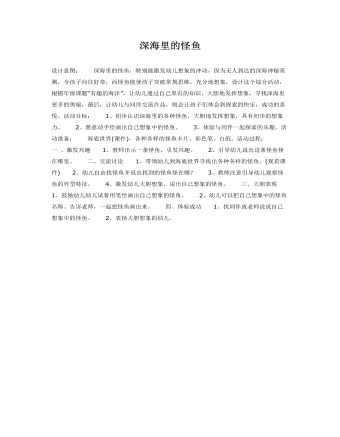
中班综合教育活动教案深海怪鱼
1、初步认识深海里的各种怪鱼,大胆地发挥想象,具有初步的想象力。 2、愿意动手绘画出自己想象中的怪鱼。 3、体验与同伴一起探索的乐趣。活动准备: 海底世界(课件),各种各样的怪鱼卡片,彩色笔、白纸。活动过程: 一、激发兴趣 1、教师出示一条怪鱼,引发兴趣。 2、引导幼儿说出这条怪鱼怪在哪里。 二、交流讨论 1、带领幼儿到海底世界寻找出各种各样的怪鱼。(观看课件)2、幼儿自由找怪鱼并说出找到的怪鱼怪在哪? 3、教师注意引导幼儿观察怪鱼的外型特征。
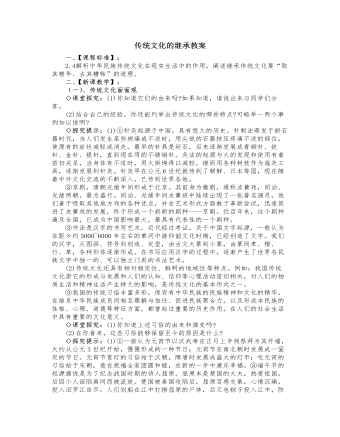
人教版高中政治必修3传统文化的继承教案
◇探究提示:传统文化对现实生活是财富还是包袱,要具体问题具体分析,不可一概而论。例如,“忠”是我国古代伦理道德的最高原则,《左传》中的“临患不忘国,忠也”,要人们尽自己最大努力,为维护国家利益而献身,是积极的,对现实生活来说就是财富,应该提倡;而宋代的“君要臣死,臣不得不死”的封建忠君思想对现实生活来说是包袱,应该抛弃。2.继承传统文化的正确态度如何继承传统文化,发挥传统文化的积极作用呢?正确的态度是:“取其精华,去其糟粕”,批判继承,古为今用。面对传统文化,要辩证地认识它们在现实生活屯的作用,分辨其中的精华和糟粕。对于传统文化中符合社会发展要求的、积极向上的内容,应该继续保持和发扬。对于传统文化中不符合社会发展要求的、落后的、腐朽的东西,必须“移风易俗”,自觉地加以改造或剔除。
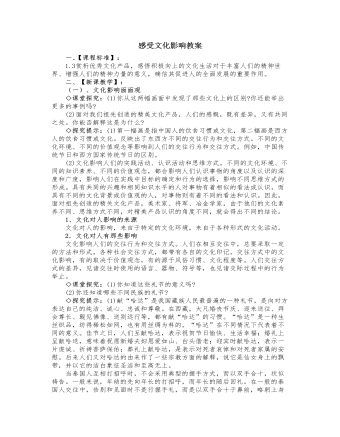
人教版高中政治必修3感受文化影响教案
世界观、人生观、价值观是人们文化素养的核心和标志。一个人的世界观、人生观、价值观是在长期的生活和学习过程中形成的,是各种文化因素交互影响的结果。世界观、人生观、价值观一经形成,就具有确定的方向性,对人的综合素质和终身发展产生深远而持久的影响。◇课堂探究:(1)你能补充一两个定居海外的华裔在生活方式和习俗方面仍然表现出受我们民族文化影响的事例吗?(2)能否谈谈你阅读这段话时的感悟,并用自己的理解说明文化对人的影响力?◇探究提示:(1)启发同学们搜集材料,了解历史上或现实生活中海外华侨的生活方式受中华民族文化影响的具体事例。(2)通过阅读这段话,可以感受到,一段丰富的人生经历、一份令人心动的情感、一种远大的理想、一种催人奋进的力量,会深深地影响着人的发展。
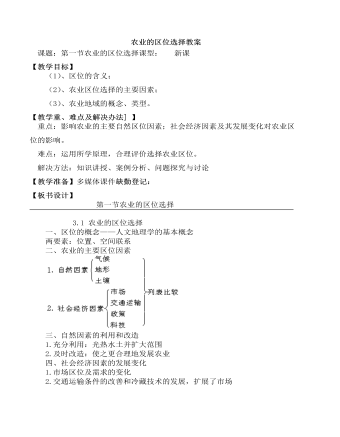
人教版高中地理必修2农业的区位选择教案
【教学目标】 (1)、区位的含义;(2)、农业区位选择的主要因素;(3)、农业地域的概念、类型。【教学重、难点及解决办法] 】重点:影响农业的主要自然区位因素;社会经济因素及其发展变化对农业区位的影响。难点:运用所学原理,合理评价选择农业区位。解决方法:知识讲授、案例分析、问题探究与讨论【教学准备】多媒体课件缺勤登记:三、自然因素的利用和改造1.充分利用:光热水土并扩大范围2.及时改造:使之更合理地发展农业四、社会经济因素的发展变化1.市场区位及需求的变化2.交通运输条件的改善和冷藏技术的发展,扩展了市场
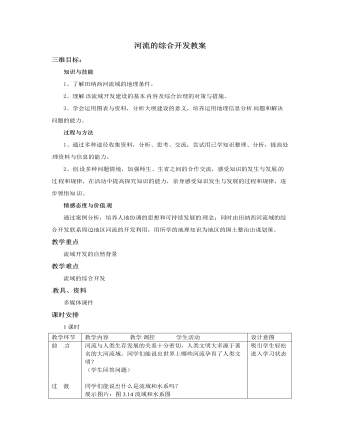
人教版高中地理必修3河流的综合开发教案
问题:1、对田纳西河流域进行开发能产生哪些方面的效益?2、如果只 提高土地利用程度,是否能保证其他方面的效益不受影响?如果受影响分别说明产生了什么后果?应如何治理?这体现了地理环境的什么特性。(学生读课文归纳总结)读问题研究内容,思 考下列问题1、 阿斯旺大坝位于哪个国家?它的建立为该国农 业生产提供了哪些有利条件?2、 阿斯旺大坝的建立带来了哪些经济效益?又产生了哪些不利影响?3、 我们应如何评价这一工程利与弊?它对我国三峡大坝的建设有什么借鉴意义。同学们,通过本课的学习我们已深切地感受到河流流域的综合开发给我们的生活带来了巨大的改变,但我们更应看到人类的 经济活动对生态环境产生的不利影响,怎样才能趋利避害,造福人类,这是我们每个人都应思考的问题。
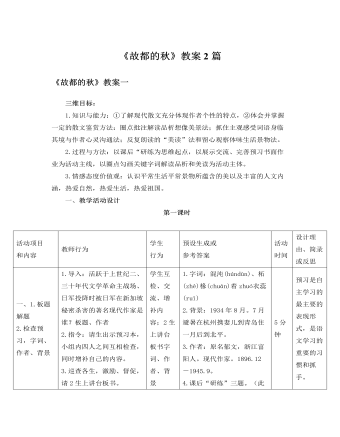
人教版高中语文必修2《故都的秋》教案2篇
三、具体研习1、文章的哪些段落描写了故都的秋?郁达夫先生既然这么喜欢故都的秋,那么他选取了哪些画面来写故都的秋?(学生阅读圈点,教师引导学生找关键词、关键句。)明确:从3--11自然段。主要是5幅画面,第3段庭院静观(破屋秋色),第4段槐树落蕊(街头落蕊),第5段秋蝉残鸣,第6—10段闲话秋凉,第11段清秋佳果。2、故都的秋有什么特点?明确:清、静、悲凉。2、作者在对这些景具体的描绘中,是如何体现故都秋“清、静、悲凉”的特点的呢?(下面先请同学来诵读课文3——11段落,其他同学要眼耳手脑并用,一是圈出文中体现秋天色彩的词语,二是标出传递声响的物名。我们将从“秋色”和“秋声”两个角度来品味一下故都的“秋味”。)

人教版高中语文必修2《离骚》教案2篇
四、品味诗歌艺术1、诗人是如何表现其品质的?运用了什么修辞手法?产生了怎样的表达效果?明确:诗句“扈江离与辟芷兮,纫秋兰以为佩”很好地体现了诗人光辉俊洁的人格。用“江离”“辟芷”“秋兰”三种香草来装饰自己,比喻自己,极其生动形象地表现了诗人自己美好的精神世界,使诗歌充满了浪漫主义气息。2、《离骚》中作者常以“香草”、“美物”来比喻自己、贤士和君王,并表达政治理想,这是《离骚》的一大艺术特色,这种方法叫做“移情法”,即不直接说出自己想说的话,而是把它寄寓于某一物上,也就是“移情于物”,这种方法在古典诗词中广泛运用,在政治不清明的时代,借用“移情”,可言难言之语,抒难抒之情。请找出相关的诗句,说说诗人是怎样运用这些比喻来表达政治理想的。

人教版高中语文必修2《短歌行》教案2篇
教学过程:一、导语毛泽东在《沁园春雪》俯视封建君王“惜秦皇汉武。。。只识弯弓射大雕。”但如果历史上只有一个人可以与他相提并论,这个人只能是魏武帝曹操。“滚滚长江东逝水,浪花淘尽英雄。是非成败转头空,青山依旧在,几度夕阳红。”(《三国演义》卷首词)在历史的大浪淘沙中,有多少英雄能够经得起历史的千淘万漉而流芳百世呢?曹操应该是三国时代留下了浓重一笔的人物。老师总结,并启发他们去联系:我们学过他的《观沧海》“东临碣石,以观沧海…”还有《龟虽寿》“神龟虽寿,猷有竟时。老骥伏枥,志在千里;烈士暮年,壮心不已。”《青梅煮洒论英雄》中曾和他见过,《三国演义》电视剧播出后,大家和他也就频频见面了。《三国演义》第48回“宴长江曹操赋诗”中,赤壁之战前夕,曹操和众部将一起狂饮,他四顾空阔,心中大喜,与诸将讲述自己希望收服江南的雄心壮志。

人教版高中语文必修3《琵琶行 并序》教案
9、在乐曲终了之后,诗人以“东船西舫悄无言,唯见江心秋月白”两句结尾,这两句作用如何?明确:诗人没有直接写听者的热烈反响以说明琵琶女技艺非凡和乐声的感人至深,否则过于直白就不含蓄,不含蓄也就显不出深沉了。用“东船西舫悄无言”的寂静无声,反衬“有声”的音乐效果,可谓“此时无声胜有声”了。人们无声地沉浸、陶醉在艺术的享受之中,那深深打动人的乐声仿佛缭绕迂回耳际,不由得使诗人想到了自己浩茫的心事,引起情绪上的波澜。在这片刻的沉寂中,只见一轮迷蒙的冷月荡漾在江心的微波之中,它提醒诗人从乐声中回到现实中来。这句景物描写点染烘托了浓重的氛围,与复杂的乐声融为一体,共同表现了琵琶女与诗人息息相通的复杂情感,是那么的忧愤、哀怨凄楚、苍凉,给整个音乐形象补足了画龙点睛之笔。

人教版高中语文必修3《登高》教案2篇
【设计思想】诗歌教学的关键是感受诗景,体味诗情,领悟诗意,在此基础上孕育理解能力、鉴赏能力和审美情感。诗景、诗情、诗意均由文字来承载,把握文字组合的张力,是读诗赏诗的抓手。杜甫的诗歌素以炼字精深、涵盖深远著称,以《登高》而言,往往淡淡一字,平平一语,便笼大千于方寸,缩古今于一瞬。故细读文本,咀嚼字句,便是赏景、悟情、会意的基本路径。其次,不朽名作的特点是寄寓深广,古今评价甚多,见仁见智,不一而足。这正是培养学生问题意识、探究意识的极好凭借。第三,诗为语言之精华,是诗人心里涌出的情感之流。诵读乃赏诗之要着,精心感悟之时,设身处地,心惟口诵,是理解诗意的关键一步。基于是,笔者作如下同课异构,殊途同归。【教学目标】1.理解本诗所绘之景、所抒之情及绘景、抒情之法。2.学会用意象叠加法、字句推敲法、诵读体验法等欣赏诗歌。3.感受杜甫心系苍生、情寄邦国、忧国忧民、兼济天下的博大情怀。

